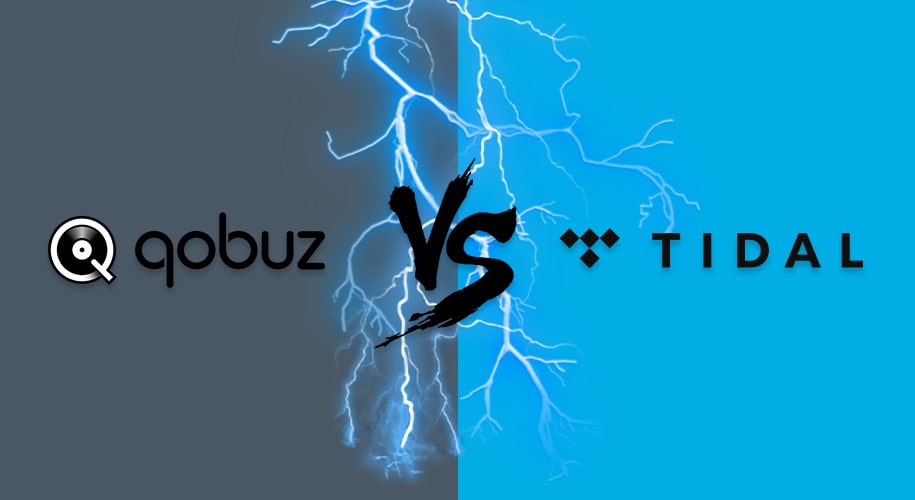Qobuz VS Tidal. The definitive comparison

![]()
In the growing music streaming market, Tidal and Qobuz stand out for offering audiophile-focused high-fidelity services. Here is a detailed comparison of the two platforms based on several key criteria.
Qobuz:
Qobuz is a French online music streaming provider. Established in 2007, it is one of the pioneering platforms for online music streaming. Originally, the service was only offered in selected markets such as the Netherlands, UK, Germany, Italy and Spain. The company is now expanding its reach to more nations, including the United States. Qobuz is now available in 24 countries. It provides music in uncompressed CD quality (16-bit/44.1 kHz) and high-definition audio (up to 24-bit/192 kHz). Qobuz packages include Studio and Sublime, which are offered in Solo, Duo and Family modes.
Tidal:
Tidal is an American audio streaming service founded by Jay Z in 2014. Tidal features songs, audiobooks, podcasts, music videos and more. Available in more than 61 countries around the world, it represents an excellent alternative for international users. It offers high-fidelity uncompressed FLAC (up to 16-bit/44.1 kHz) and HiRes FLAC (up to 24-bit/192 kHz) audio. Tidal has HiFi and HiFi Plus subscriptions, which include Individual, Student, Family, Military and First Aid options. However, from 10 April 2024, a budget plan simply called "Tidal" will be introduced.
Sound Quality.
Both Tidal and Qobuz place great emphasis on audio quality. Tidal offers two main levels of quality: HiFi, which provides lossless music at CD-quality (FLAC, 16-bit/44.1 kHz), and HiFi Plus, which includes high-resolution audio (up to 24-bit/192 kHz) and support for immersive formats such as Dolby Atmos and Sony 360 Reality Audio.
Qobuz stands out by offering high-resolution streams that can go up to 24-bit/192 kHz, surpassing Tidal's offering in terms of the highest file quality available. Tidal also offers high quality audio through its HiFi tier, which includes support for Master Quality Authenticated (MQA) that provides high-resolution audio, but Qobuz offers music files in FLAC format, a lossless format easily playable on many hi-fi audio devices without the need for special decoding.
Music Catalogue.
Qobuz boasts a catalogue that includes both greatest hits and classic recordings, focusing on quality over quantity. Qobuz also offers its users access to a wealth of digital librettos, which are especially useful for classical and jazz music lovers. These booklets can enrich the listening experience by providing context and details about the music, artists and recordings.
Unlike Tidal, Qobuz offers a download service, allowing users to purchase and download music that they can keep permanently. This is attractive to users who prefer to have a copy of their music, rather than relying exclusively on streaming.
User Experience.
Both platforms offer clean and easy-to-use interfaces, although the experience may vary slightly from device to device. Tidal has been praised for its integration with home theatre systems and its functionality with different devices and music services, while Qobuz stands out for its focus on playback quality and detailed album and artist information, which is appreciated by more traditional music fans and audiophiles.
Sharing and Family Functionality.
Both Tidal and Qobuz allow up to 5 members to be added to their family plans. Credentials are shared via an invitation, making it easy to manage who has access.
Ultimately, the choice between Tidal and Qobuz will depend on your specific preferences in terms of sound quality, type of music, and value for money. Both services offer free trials, which is a great way to experience each platform before committing to a subscription.
Frequently asked questions about Tidal vs Qobuz
Which is better for classical music, Qobuz or Tidal?
In terms of classical music, Qobuz outperforms Tidal. It especially excels in this genre, as 19% of its catalogue is dedicated to classical music and many of its exclusive reviews focus on classical albums.
Which is better, Tidal, Qobuz, Spotify, Apple Music, Deezer or Amazon Music?
- Qobuz is appreciated for its vast collection of high-resolution audio, especially classical music.
- Tidal is distinguished by its high-fidelity sound quality and its focus on connecting artists with their fans.
- Spotify is renowned for its extensive library of songs and playlists, personalised recommendations and collaborative playlist possibilities.
- Apple Music integrates seamlessly with the Apple ecosystem, offering curated playlists and exclusive releases.
- Deezer focuses on music discovery with its "Flow" feature and detailed editorial recommendations.
- Amazon Music provides a wide repertoire of music, including exclusive content for Prime members, and integrates with Alexa devices for voice control.
Determining which is best depends on individual preferences and needs. It is advisable to compare the features most relevant to you and choose the streaming service that best suits your musical interests.
Get 2 MONTHS FREE in Qobuz

Now, when you subscribe to our newsletter, you will receive a FREE two-month subscription to Qobuz, the premium music streaming platform.
Qobuz gives you unlimited access to a vast library of hi-fi music, perfect for audio enthusiasts looking for the best sound quality. Explore genres ranging from classics to the latest releases, and enjoy a superior listening experience.
How can you take advantage of this incredible offer? It's simple:
1. Visit our website.
2. Enter your email address to subscribe to our newsletter.
3. Receive your access code for two free months at Qobuz.
Don't miss this unique opportunity! Immerse yourself in the world of music with Qobuz and enjoy sound quality like never before. Subscribe today!
